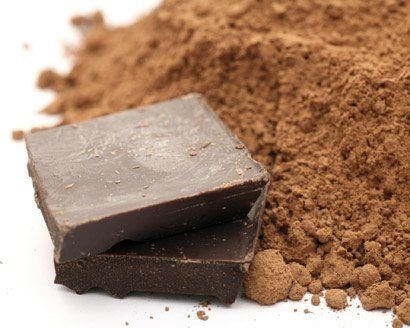Cocoa: A Serious Superfood
Scanning the covers of magazines and books, it appears that one of the most powerful keywords to prompt purchase of these publications is "superfoods." A quick search on Amazon alone brings up more than 450 book titles that include the term.
Superfood is not a term recognized (or defined) by the USDA, and in nutrition and medical circles is quite controversial. The term is typically used to describe a food that has a higher than average concentration of a nutrient (or multiple nutrients) that has a proven health benefit.
So what does this have to do with chocolate?
A systematic review and meta-analysis of controlled trials, first published in the fall of 2011, then followed by another study published in the American Journal of Clinical Nutrition in January of this year, "examined the effect of flavonoid-rich cocoa and all major cardiovascular risk factors." The findings of the review of 24 papers with 1106 participants, as reported in The Journal of Nutrition, and told to SupermarketGuru by one of the researchers, Eric Ding, Ph.D., showed that the cocoa consumption improved blood pressure, insulin resistance, lipid profiles, and flow-medicated vascular dilation. Top line? All seemingly good news for our cardiovascular system. And as a result, there has been a flurry of new articles touting chocolate as the latest superfood.
Reports point to the more than 300 chemicals in chocolate, and it seems as if scientists are always discovering new information about how they work in the human body. Some research has pointed to the antioxidant effects of dark chocolate as well as its mood-elevating properties. In fact, 100 grams of cocoa contains a whopping 13,120 oxygen radical absorbance capacity (ORAC), the measure of antioxidant capacity! Antioxidants have the potential to improve overall health, delay the onset of many age-related diseases, reduce the risk of some cancers, improve cardiovascular function, and more.
A study from researchers based at Reading University's School of Psychology and Clinical Language Sciences in the UK (published in Scientific American) found that consuming cocoa flavanols may improve aspects of eye and brain function. The study looked at acute intake of cocoa flavanols and then tested the subject's vision and cognitive performance and found that both were improved.
While all chocolate contains flavonoids, it is important to choose dark chocolate with a cacao content upward of 70 percent. The higher the cocoa percentage, the more flavanols and antioxidants it contains. Ding did add the fine print: To get the cardiovascular benefits from the cocoa flavanols you would have to eat 33 milk chocolate bars a day! The good news? Switching to dark chocolate means only eating eight to nine bars daily. Do keep in mind that the sugar will offset these amazing benefits — so think about adding minimally processed cocoa powder to smoothies, plain yogurt, and hey, why not make chicken mole?
